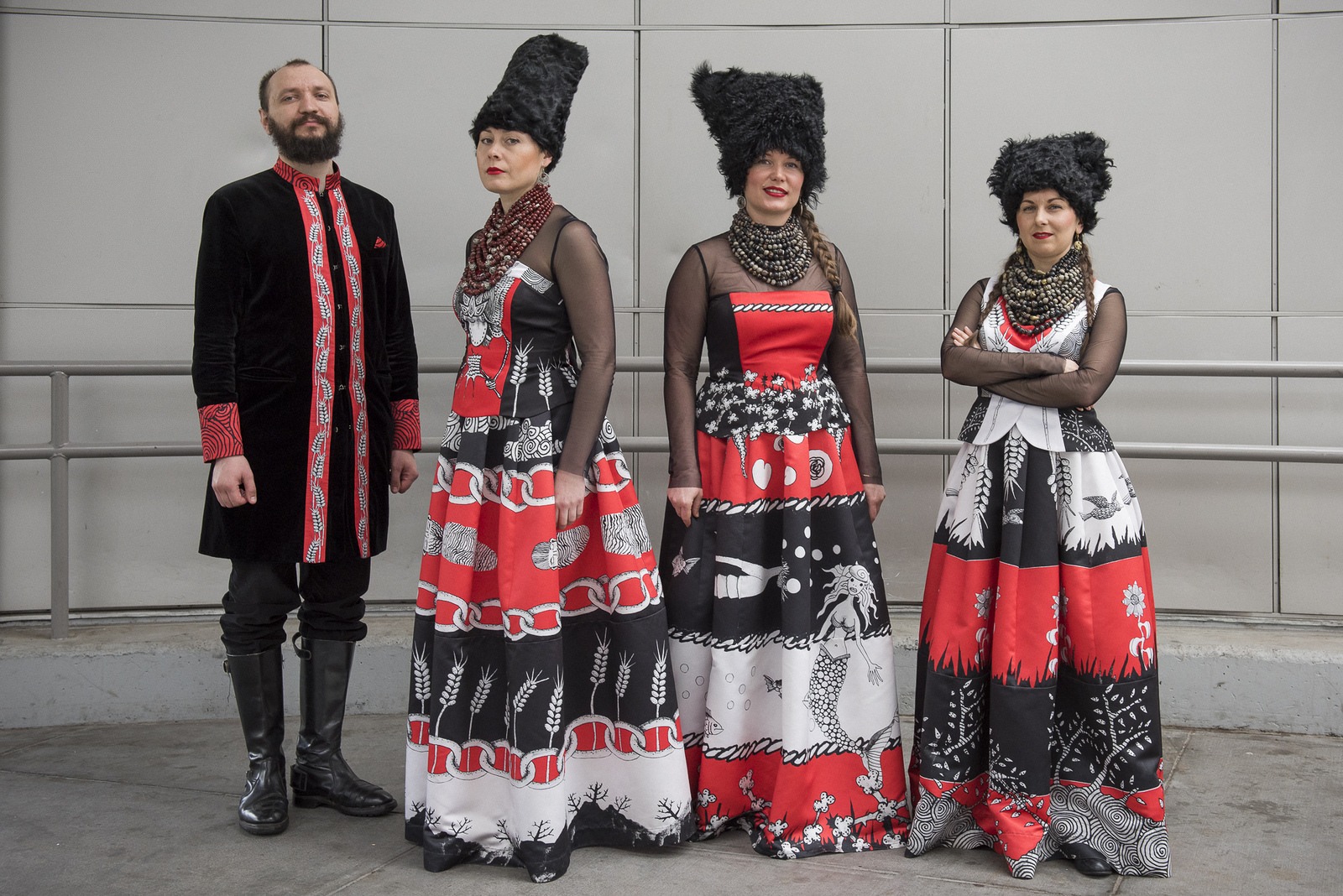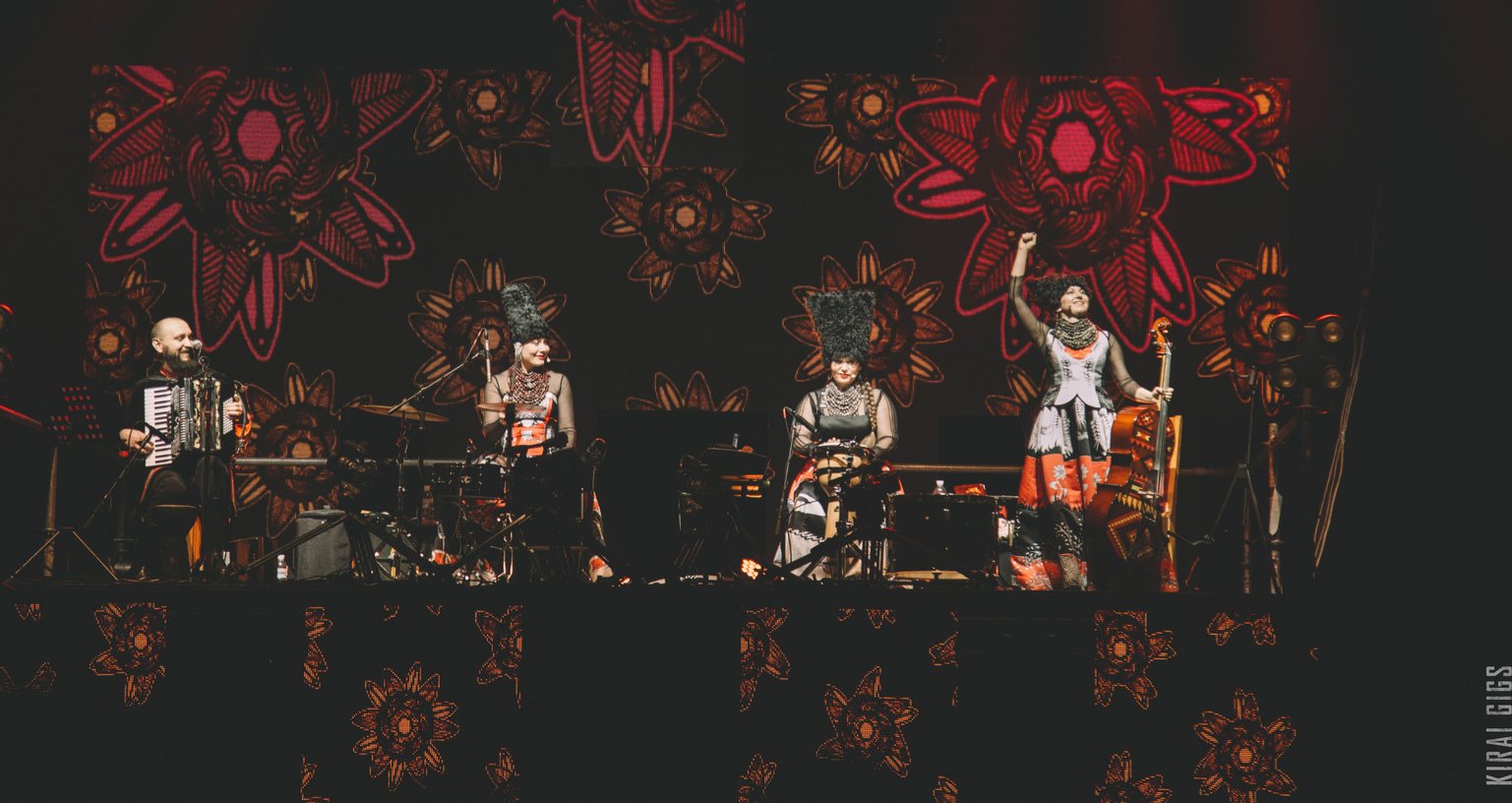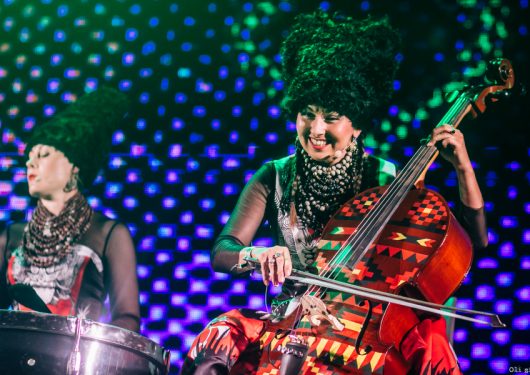Freedom Fighters: DakhaBrakha at OZ Arts
It felt like rare musical events I’ve actually experienced—the opening tour date of Talking Heads’ “Stop Making Sense” in Berkeley, Parliament Funkadelic’s “Mothership Connection” tour stop in Chapel Hill, New York City Ballet’s reincarnation of works by the emblematic trilogy of Balanchine, Stravinsky, and Chagall. It felt like historic musical events I’ve only read about—Woodstock, the premiere of Stravinsky’s Rite of Spring. But here, in teh OZ Arts building there was something more.

A fog machine misted the darkened room, just as disquieting thoughts of war misted our darkened thoughts. Young women with crowns of fresh flowers circling their heads waited anxiously. Clusters of people with blue and yellow fabric draping their laps fidgeted in expectation. Most of the rest didn’t know what to expect. I sat in excitement and anticipation of musicians I knew only through the freedom of the internet.
And there they were! DakhaBrakha. The audience exploded, we leapt to our feet with wild applause. The quartet of three women and one man looked a bit startled. After all, they were in the Deep South. This would be their only foray outside the relatively safe spaces of the East and West Coasts of the USA with a stop in Chicago, before performances to Canada, Great Britain, then back to Continental Europe where they must often live in hiding upon reentering a country under siege. Given the rare, but real pockets of isolationist sentiment in the US, they could not know what their reception might be, although they had performed at Tennessee’s famed Bonnaroo festival in 2014 to great acclaim in Rolling Stone magazine.
But that was then.
They could not have chosen better. The Music City lived up to its name, welcoming these singularly talented musicians who fight for their homeland’s freedom. They fight just as freedom fighters in our own nation’s history fought, using a powerful weapon—the fierce beauty of music. This ensemble earned their enthusiastic welcome with a program that fused folk, rock, funk, blues, and freedom songs. The widely varying images projected onto the screen behind them, occasionally lit by moving spot beams, enhanced the effect.
Several years ago, I’d chanced upon DakhaBrakha while surfing National Public Radio Tiny Desk Concerts on YouTube. There they were, a quartet with a rhythmic name and odd hats. The lace and embroidery of their clothing brought back memories of traditional Bulgarian women’s clothing from a World Musics course taught eons ago. For old time’s sake and fondness for the bold full-throated singing style of Eastern European women with its stunning dissonances, I clicked, and that was my introduction to DakhaBrakha, a phenomenal ensemble from Kyiv, Ukraine. Having read articles and watched videos of concerts and interviews across the United States in the years prior to the current Russian invasion, the announcement that they were coming to Nashville was thrilling. DakhaBrakha, a group in which every member sings, consists of Iryna Kovalenko on piano and percussion; Olena Tsybulska on drum set; Nina Garenetska on cello; and Marko Halanevych on accordion, concertina, cajon and drymba (jaw harp). Their formal training comes primarily from the University of Kyiv and an avant-garde theater arts collective known as Dakh. They make music with meaning, sound filled with the desperate determination to be free. I knew that sound from the times of desegregation, the anthems of the Civil Rights movement, sung with that unmistakable something that tapped into the core of what the best of human courage is all about.
DakhaBrakha, a group in which every member sings, consists of Iryna Kovalenko on piano and percussion; Olena Tsybulska on drum set; Nina Garenetska on cello; and Marko Halanevych on accordion, concertina, cajon and drymba (jaw harp). Their formal training comes primarily from the University of Kyiv and an avant-garde theater arts collective known as Dakh. They make music with meaning, sound filled with the desperate determination to be free. I knew that sound from the times of desegregation, the anthems of the Civil Rights movement, sung with that unmistakable something that tapped into the core of what the best of human courage is all about.
Their name, Ukrainian for “give and take,” could not be a more perfect representation of their music. DakhaBrakha gives bone-chilling chord clusters from native traditions, tight dissonant clusters that often dissolve into perfectly tuned unisons or octaves. They take the gliding blue notes, funky bass lines, and backbeats from freedom fighters who came before, translating them into their own musical language.
“Carpathian Rap,” for example, the tale of a woman looking for a husband but finding the pickings slim, opens with the jaw harp buzzing in the background as splashes of piano chords accompany Nina’s lovely folk melody. That melody morphs into a tight rap, with a funky bass line on her brightly decorated cello. In “Monakh” Iryna even adds a bit of speed rapping that might catch Busta Rhymes’ attention and the two other women join in some old-school hocketing (a technique from European Medieval times where parts of a sentence are split between more than one person, made famous in later times by Run-DMC’s “Walk This Way”). Then Marko jumps up to a BeeGees-adjacent falsetto.
On the screen behind them, the images varied. Colorful abstract images often resembled those painted by Australian Aboriginal artists (this is not so unexpected as one might imagine since Marko is also known to play the didjeridoo). Photographs included scenes from past and present as varied as traditional families in Crimean villages; burning buildings in Mariupol; sunlight on wheat fields; and the soldiers. Soldiers, both male and female, were pictured at war and taking breaks with rescue pets, holding guns and violins, walking through snow and talking on cell phones. Childlike animation of the hills and dales of Ukrainian fables included cute figures of the DakhaBrakha foursome. Periodically between these projected images, there were bold, unadorned, unapologetic statements:
Ukraine Will Win
ARM UKRAINE NOW
STAND WITH UKRAINE
RUSSIA IS A TERRORIST STATE
And the audience cheered each time one popped up. But the intensity of the moment and the cause was skillfully tempered. One of the most delightful numbers was “Vesna” which, like French composer Olivier Messiaen, celebrates bird calls. In this evocation of springtide, Marko keeps a steady syncopated beat with chords on his tiny concertina, while Nina’s cello strings resonate, gliding into the depths of its range. Initially, the bird calls seem random as in nature, but eventually, Olena brings in the drum beat, and Iryna calls out in the bold Eastern European field call style, ending with Marko’s snarky crow call to top off the return of the randomness.
tempered. One of the most delightful numbers was “Vesna” which, like French composer Olivier Messiaen, celebrates bird calls. In this evocation of springtide, Marko keeps a steady syncopated beat with chords on his tiny concertina, while Nina’s cello strings resonate, gliding into the depths of its range. Initially, the bird calls seem random as in nature, but eventually, Olena brings in the drum beat, and Iryna calls out in the bold Eastern European field call style, ending with Marko’s snarky crow call to top off the return of the randomness.
One song, “Baby” had serious Soul resonance with the falsetto lead, gospel background harmonies, and the harmonica. One measure of DakhaBrakha’s skill is making a patter song-style break in Ukrainian with Nina wailing an obbligato seem perfectly appropriate as part of a Soul song. They sometimes call their music “ethno-chaos” and that works. It’s true to their ethnic roots, but also to roots music around the world. Old and new, east and west, ultimately altogether human, chaos and all. The gift of sunflowers in a bouquet to each performer was the perfect ending for a memorable, meaningful experience.



